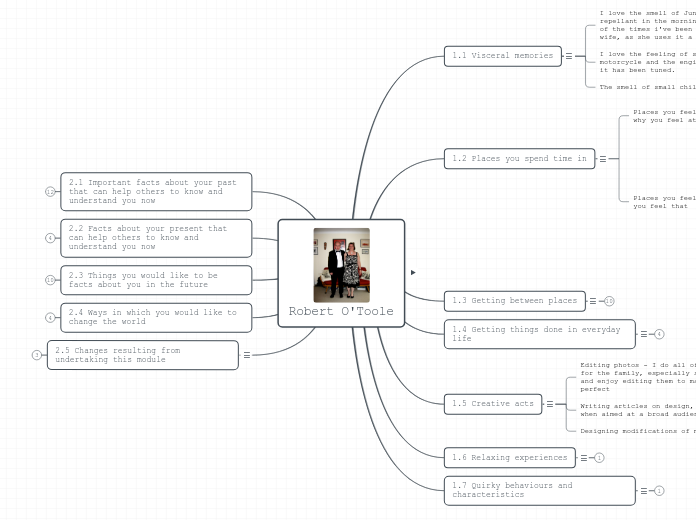por Robert O'Toole 2 anos atrás
247
Robert O'Toole

por Robert O'Toole 2 anos atrás
247

Mais informações
Don’t complete this until we tell you to, but think about it all the way through. It will be a key component of your reflective essay.
What do you do that other people mind find odd? Are there things about you that aren’t necessary, but which you want to keep because they are what makes you you? Add them to this branch.
Sometimes we do things just to get a break from life, to replenish our energies. Relaxation matters. And you can tell a lot about a person by how they relax. Tell us about it in this branch.
Everyone is creative in some way. You don’t have to be a great artist. Your creativity might be in your essays, in the way you dress, in cooking, or on a sports pitch. In this branch of your persona tree, list some of your creative acts.
Human behaviour is to a great extent goal-oriented. We transform things from one state into a more desirable state, using tools and methods, to satisfy our needs. In this branch of your persona map we are interested in cases of this in everyday life, where designed things work well to help you to achieve a goal (such as making coffee), and other cases where they don’t work well. Add examples from your personal experience to the map, with some details concerning why they don’t work.
How do you travel between places? What do you enjoy or not enjoy about these modes of transportation? Think about the features, how they help to make it a faster or more pleasant journey, or how they interfere with your progress and enjoyment. List and describe the means you use for short, medium and long journeys. You can upload images, video, and sound if you want.
People move between many different spaces in their daily lives and over time. This includes physical spaces (for example a bedroom), digital spaces (Facebook), and increasingly hybrid spaces that combine physical and digital (most spaces today are hybrid). We have different relationships with different spaces. Sometimes we just go into a space to get something done, and leave without caring too much for it. We are just visitors. We have little control over the space, and don’t need to understand its details. But in some other spaces, we feel like we are resident. We spend live our lives in these spaces, having more control over their features, caring for them, maintaining them, and often have deeper more persistent relationships with people in those spaces.
In his branch of your persona map, list and describe places in which you feel like a resident, and others in which you feel you are a visitor. You can upload images, video, and sound if you want. Think about how the features of the spaces differ and the features that make you feel visitor or resident.
When using it I constantly have to be remembering how to do basic things, it's just not obvious.
Even though i was born there and live nearby it always feels unwelcoming and unfamiliar, I don't even know many street names, and don't have a favourite place there in which I settle down
It's so confusing! There's no where to relax, evertything is too rushed to get to know it, and no one seems to welcome us
Taking some time to get used to it
I lived there for 2 years, and still go back often. The most important thing that makes it feel like home are the museums, which are very relaxed, full of surprises, but very familiar as well. They have the right balance.
A city full of life, culture, wildlife and the beautiful sea
Because every year we go there and spend time just looking and sensing everything much more carfefully than we do at home. And the people are really welcoming.
I've had it for 20 years and adapted it to fit me perfectly
When describing our personal response to a designed or natural feature of the world we can focus on the “visceral” nature of our response to it. This term was used by Don Norman in his book Emotional Design. It refers to the raw sensations we get immediately as we encounter something, rather than our attempts to understand it through intellectual activity. Visceral feelings may be combinations of different senses – taste, smell, look, touch, sound. Sometimes they are dominated by a single strong sensation. For example the smell of bread cooking.
This triggers an emotional response, often linked to a physical and emotional opportunity or threat.
We often vividly remember specific situations we have encountered in the past, associated with the sensation. The novelist Marcel Proust famously described how vivid memories were triggered for a character in his book by the smell of warm madeleine cakes.
In this branch of your persona map list and describe visceral sensations that you have encountered in specific situations and what they mean to you. For example, the smell of burning rubber might have negative and positive connotations linked to narrowly avoiding a car crash.